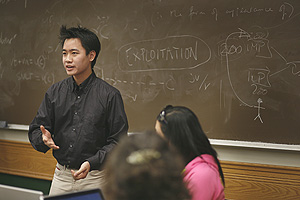Campus Catalyst trains students to manage non-profits
By Deva Woodlydeva@uchicago.edu
News Office
 Photo by Beth Rooney Bryan Ho, a third-year, explains his team’s proposal for the non-profit organization called, “Got ya” during a class presentation of student projects. When working with a non-profit client as part of the Campus Catalyst program, Ho has learned that refining one’s project scope is as important as the initial planning stages. |
|
What started as a non-profit organization and student club, organized by two habitual volunteers, quickly evolved into a for-credit course and eventually expanded its reach from a North Side campus to the University’s South Side.
Molly Day, a 2007 graduate of Northwestern University, and fellow classmate Kunao Modi created Campus Catalyst, whose volunteers are committed to helping the non-profit sector thrive. The program’s expansion to Chicago’s campus proved successful, and Campus Catalyst is now offered as a course in the Social Sciences Division through the undergraduate major in Public Policy Studies.
Campus Catalyst recruits student volunteers to learn the basics of non-profit management in seminar style courses, while working with a non-profit client who has laid out an organization’s needs in an application. “Our students are not experts,” Day said, “but they are trained to be problem solvers, and that’s what the non-profits need them to do.”
Irene Sherr, Executive Director of the Hyde Park Cultural Alliance and a client of Campus Catalyst, raves about the group. “They’re full of ideas, and they are all so tech savvy. They’re building a Web site for my organization, and I’ve been very impressed with the caliber and dedication of the students.”
According to Day, the purpose of Campus Catalyst is twofold, “First, it is to build the capacity of local non-profits. To help them grow and allow them to be more effective. Second, it is meant to empower the next generation of leaders and keep them involved in civic engagement.”
A lifelong volunteer, Day believed that the skills and talents were under-utilized in the community. While volunteering, she observed, “a group of college students would be there dishing out soup at a soup kitchen, which is great, but so often at the same time that organization was struggling to sustain a functioning business model.”
Debra Schwartz, an expert in non-profit finance and a 14-year veteran of the MacArthur Foundation, is the course instructor for Campus Catalyst participants. She first encountered the program as a guest speaker. “I was taken with the energy and excitement of the students. I was impressed that the program asked them to engage with the non-profit sector not just as volunteers, but also with an interest in them as institutions. That is very unique.”
Schwartz also was drawn to the program because it encouraged hands-on learning. “I felt it was really important that the students not only do a basic survey of topics in the literature, but also get out there and work with actual organizations. It creates a respect for the challenges and opportunities that exist at non-profits in the real world. It’s hard work, and this course allows them to learn by doing,” said Schwartz.
Since its inception just two years ago, Campus Catalyst has enrolled 95 undergraduates, 25 graduate-student mentors and 20 non-profit organizations. Students taking the class devote between 10 and 20 hours to coursework and weekly meetings with graduate student mentors at Chicago Booth and the Harris School, as well as with their client organizations.
For the students it seems to be a deeply practical experience. Bryan Ho, a third-year in the College, described the process of working through a development plan with one of the non-profit clients: “We started out with grand ideas about revolutionizing everything—IT, infrastructure, marketing, but as things go on and you realize you only have 10 weeks, the scope becomes narrower.”
This ability to refine the scope of the projects is important, said Schwartz. “The students have really rolled up their sleeves and tried to fashion useful work products. That means they have to take the time to really look at themselves and utilize what they bring to the table.”
Day hopes Campus Catalyst inspires students to stay involved with non-profits even if they decide to pursue other kinds of careers. “It’s about staying engaged. Not just as the program officer or director of a non-profit, but as an effective member of the board, a community supporter, a donor or a regular volunteer. All of these positions help make the non-profit sector strong.”
Schwartz, who has nearly 30 years of experience working with non-profits, notes “there will be an enormous transition in the next few years as many of the people heading up non-profits retire. However, she added, “the earnestness and level of creativity and interest that these students show makes me very optimistic for the future.”
![[Chronicle]](/images/sidebar_header_oct06.gif)